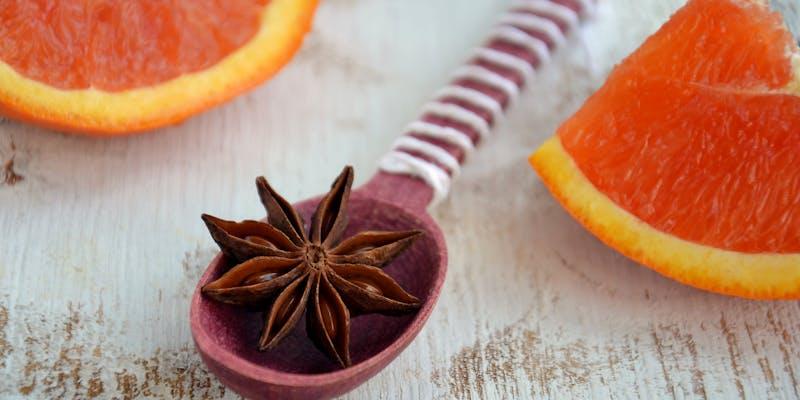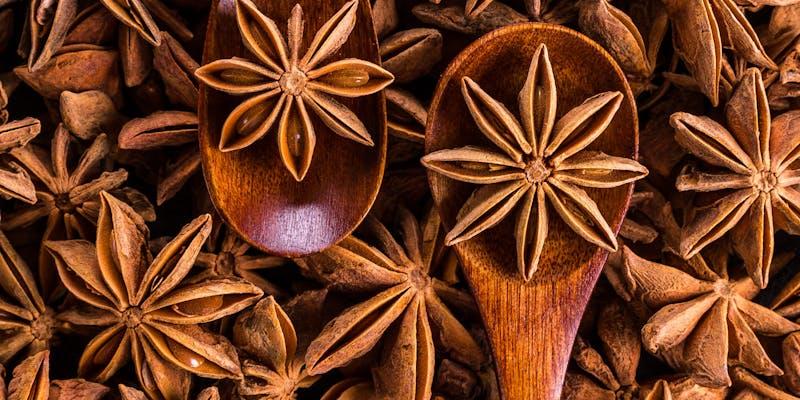Star anise spice comes from a small evergreen tree in southern China and Southeast Asia. Chinese cooking usually uses whole star anise, but other meals, including roast duck, anise seed tea blends, sauces, broths, and pho noodle soup, utilize it too. Western cultures flavor sambuca, absinthe, and pastis with it. Its licorice flavor makes it popular in baking. Lets read further to understand the nutritional facts of star anise.
Nutritional Value of Star Anise

100 g of Star Anise spice yields almost 359 Kcal energy with the following nutritional profile.
- Protein: 18 g
- Iron: 37 mg
- Carbohydrate: 50 g
- Sodium: 16 mg
- Calcium: 646 mg
- Fat: 16 g
- Dietary Fiber: 15 g
- Potassium: 1441 mg
- Saturated Fat: 0.6 g
Benefits of Star Anise

Treats Microbial Infections
Several studies have shown that the helpful compounds in whole star anise may support the defense against different kinds of germs. The strongest antibacterial properties are seen in shikimic acid, linalool, and anethole, and they are present in star anise.
This spice helps several microorganisms causing urinary tract infections, ear infections, and other diseases avoidable by consumption. Star anise spice may also reduce diseases like asthma and diarrhea as well as inhibit E. coli bacterial development. Against more than 60 different kinds of bacteria impervious to antibiotics, this plant has proven effective.
Furthermore, flavonoid anethole is well-known for its antifungal properties, which provide star anise with its distinct flavor. Scientists observed that this flavonoid may protect food plants from harmful fungi. Moreover, test tube studies reveal that Star Anise's terpene linalool may help resist poisonous mushrooms.
Star anise tea is also useful in eliminating certain infections. Currently, it is believed to be the primary source of shikimic acid, the ingredient driving Tamiflu's flu-fighting action. Since virus pandemics occur more often, star anise spice is in greater demand daily.
Calms Anxiety
Studies on the chemical present in whole star anise, anethole, suggest it can help lower anxiety. Mice demonstrated to exhibit soothing effects from anethole point to its use in treating anxiety. Still, these findings originate from animal research, so clinical trials on humans are necessary to make sure these advantages also apply to humans.
The findings are positive, suggesting that star anise spice could be a natural means of relaxation from anxiety. People seeking natural means of stress and anxiety management might choose to consider star anise. Noting that these early studies are favorable does not imply one should substitute them for professional medical advice or treatment.
Further research is required to learn how anethole influences anxiety completely. Moreover, this emphasizes the potential of star anise as a different approach to cope with stress, at least until more thorough studies on its consequences.
Regulates Blood Sugar
Astrocaryum is renowned for its ability to control blood sugar levels. The primary molecule doing this is anethole; it is also crucial in the breakdown of carbs. Through animal research, anethole has been shown to lower blood glucose levels effectively. Those with high blood sugar will find this to be a helpful spice.
High blood sugar may lead to serious medical issues, like weight loss, tiredness, constant thirst, renal failure, and nerve damage. Those with a family history of diabetes might find great advantage in including whole star anise into their diet.
Though further study is required to ascertain if these advantages also apply to humans, it is crucial to keep in mind that studies involving animals have largely shown these results. Speaking with a doctor is advised before using star anise spice as a medication to help regulate blood sugar.
Fights Cancer Cells
Star anise in big doses has antioxidants, molecules that protect cells from reactive stress and free radical damage. Maintaining cells from becoming lethal depends much on antioxidants. Some studies have demonstrated whole star anise can reduce oxidative stress and the likelihood of malignancies in animals.
Furthermore, it was shown that increasing the levels of several cancer-fighting enzymes has an effect on them. Though the outcomes have been favorable, most of the studies have been conducted on animals. More studies are required to verify whether the same advantages are observed in humans. Star anise is helpful as a natural means of aid against cancer, but it should not be utilized in place of conventional cancer therapies.
Relieves Flu Symptoms
Star Anise's high shikimic acid content makes it well-recognized to help reduce flu symptoms. Shikimic acid is a key component of several drugs used to treat and stop the flu. Actually, the bulk of the shikimic acid used in medication originates from whole star anise. This is obviously a helpful remedy for the flu, which typically strikes from October to May.
Additionally, astrocaryum has been proven to have antiviral properties; certain research has indicated that it fights some kinds of the herpes virus, among other viruses. Although these findings suggest that star anise spice may be a natural viral killer, additional research is required to grasp how it affects individuals fully.
Potential Side Effects of Star Anise
The US Food and Drug Administration (FDA) states that star anise spice is generally recognized as safe (GRS) for use as a spice or flavor agent. However, problems develop when consumers use Chinese star anise products that also contain Japanese star anise.
Experts say that Japanese star anise (Illicium anisatum) should only be used for decoration as it is quite harmful when consumed. Researchers claim that powerful neurotoxins found in Japanese whole star anise may cause major medical problems, including vomiting, vertigo, and convulsions. Those who feed newborns anise seed tea have most usually experienced these negative effects.
Moreover, further research indicates that Japanese star anise is sometimes blended into Chinese anise seed tea. Though it's difficult to distinguish, the FDA has advised consumers not to consume any kind of prepared anise seed tea.
Read the labels extremely carefully to be sure any product you purchase solely contains Chinese whole star anise. Avoiding star anise spice poisoning is mostly dependent on not knowing the precise compounds. Use sparing quantities. It's advised not to refrain from purchasing anything whenever you have questions about the source or purity of any item.




